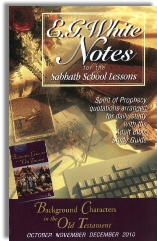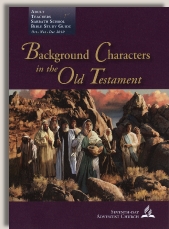|
||||||||||||||
Commentary on "Hannah: Learning to Be Someone"
Day 2: Sunday, October 10, 2010 - What Am I Worth?
To understand the significance of God’s grace towards His people, we have to look at the account of Hannah and the birth of Samuel in the light of Israel’s history and God’s faithfulness.
Elkanah and Hannah lived near the end of the period of the Judges, a time in Israel’s history when “…there was no king in Israel; everyone did what was right in his own eyes.” Judges 21:25 NASB God was Israel’s king, but the Israelites lived as though each person was king of their own lives. They rebelled time and again against God. They pursued idolatry, and as a consequence, God disciplined them by sending one of their enemies to oppress them (such as the Moabites, the Philistines, etc.) In their distress, they would turn to God in repentance, and God would send a judge to deliver them. For a while they would follow God, but within a generation or two, the cycle would repeat itself.
The time of Elkanah and Hannah was during a cycle of spiritual decline and decay. The High Priest Eli’s two sons “…were worthless men; they did not know the Lord and the custom of the priests with the people.” 1 Samuel 2:12,13 NASB When the people would go to worship, these priests would take portions of the sacrifice that didn’t belong to them. They slept with the women who served at the doorway of the tent of meeting (1 Sam 2:22). They were rebellious, wicked men who wouldn’t listen to their father’s rebuke. They certainly hindered the worship of the people, profaned the sacrifices and services of the tabernacle and brought reproach on the Lord.
Elkanah and Hannah were not exempt from the effects of spiritual self-determination. Elkanah was a polygamist with two wives, which wrecked havoc in their family bringing jealousy, favoritism, provocation and strife. He was from the tribe of Levi, from the family of the Kohathites. (1 Chronicles 6:33,34) Elkanah would go yearly to the tabernacle at Shiloh, possibly to fulfill his duty as a Levite in serving at the Tabernacle. All Jewish men were to gather three times a year to worship. “Three times a year all your males are to appear before the Lord God, the God of Israel.” Exodus 34:23 NASB We do not know if Elkanah went at all three appointed times. This family was definitely affected by the spiritual decline prevalent in Israel at that time.
Elkanah’s wife, Peninnah, had sons and daughters, but Hannah was childless. “The Lord had closed her womb.” I Samuel 1:5,6 NASB. We wouldn’t know why she was barren, except God reveals that He was at work in her childlessness. God had already shown in Israel’s history that He would bring about His special plan even though it might appear impossible because of barrenness. The patriarch Abraham’s wife, Sarah, was barren but God promised that Abraham would have a son and as many descendants as the stars of heaven! (Genesis 15:2-6) God was faithful to His promise and in their old age Isaac was born! The patriarch Jacob’s wife, Rachel, was barren, but God opened her womb and she had 2 sons, Joseph and Benjamin, who became the fathers of the tribe of Benjamin and the two half-tribes of Ephraim and Manasseh. God was working in a special way through these women’s childlessness to fulfill His covenantal promise to Abraham. God had a purpose in Hannah’s inability to conceive; it was part of His plan to raise a judge/prophet, to bridge the period of the Judges and the United Kingdom and to anoint King David, through whom the promise given to Judah regarding the Messiah would be fulfilled! (Genesis 49:10)
Summary
- Samuel’s parents lived during the time of the judges when everyone did what was right in their own eyes—a time fo spiritual decline and decay.
- Elkanah and Hannah were not exempt from the effects of spiritual self-determination.
- Elkanah was a polygamist with two wives and showed favoritism.
- Hannah was childless.
- God had already shown Israel that He would accomplish His promises even if it seemed impossible.
- Barrenness was no barrier to having a son, as Sarah and Rachel and now Hannah discovered.
- God had a purpose in Hannah’s childlessness; through it He raised up a judge/prophet to bridge the period from the judges into the monarchy.
Copyright 2010 BibleStudiesForAdventists.com. All rights reserved. Revised October 7, 2010. This website is published by Life Assurance Ministries, Glendale, Arizona, USA, the publisher of Proclamation! Magazine. Contact email: BibleStudiesForAdventists@gmail.com.
The Sabbath School Bible Study Guide and the corresponding E.G. White Notes are published by Pacific Press Publishing Association, which is owned and operated by the Seventh-day Adventist church. The current quarter's editions are pictured above.
Official Adventist Resources
Standard Edition Study Guide Week 3
Teacher's Edition Study Guide Week 3
Easy Reading Edition Study Guide Wk 3
Search the Complete Published Ellen G. White Writings


